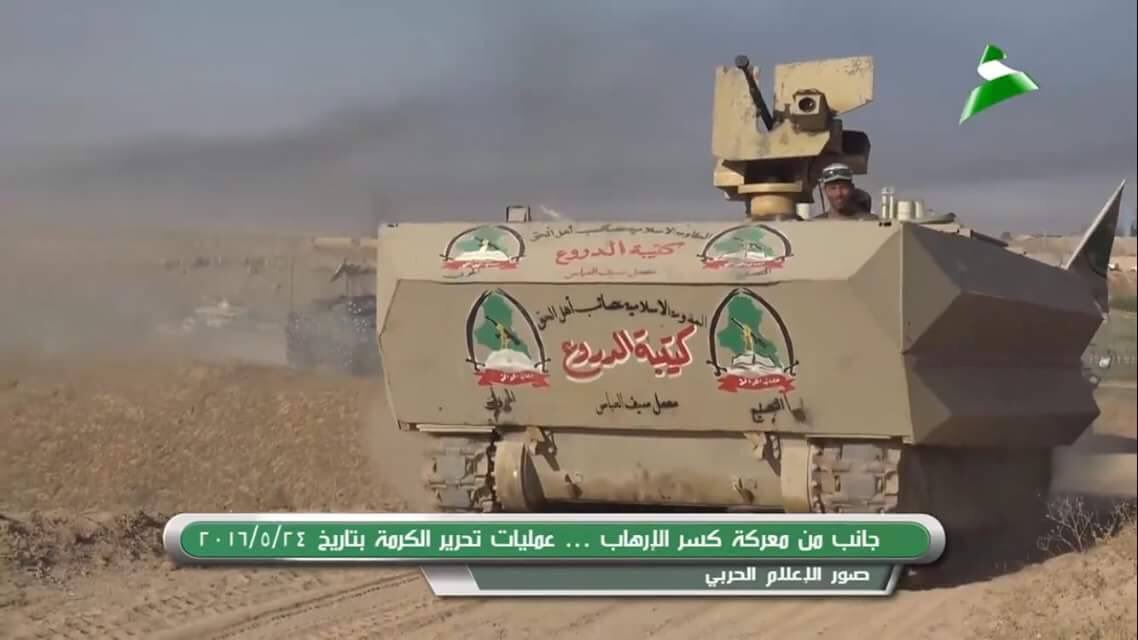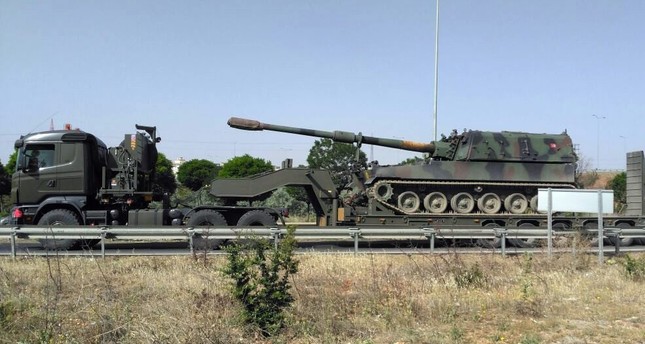
General Dempsey talking to the troops in Iraq. (Photo: CBS News)
Mighty: Like most general officers commissioned right after the Vietnam War ended, Gen. Martin Dempsey’s firsthand experience of dealing with combat losses came relatively late in his career. During the summer of 2003, then-Major General Dempsey was commanding “Task Force Iron” in Iraq when the post-invasion lull ended and the insurgency began going after American troops.
“We started taking casualties,” Gen. Dempsey recounted. “And during the morning briefing, after we talked about the high-level mission items and what we called ‘significant incidents,’ we’d flash up the names of the fallen and have a moment of silence.
“The names were up there on the screen and then, whoosh, they were gone,” he said. “After about two or three weeks of the same thing, I became really uncomfortable with that. One minute it was there and real, and then the next minute it was somebody else’s problem.”
Gen. Dempsey attended a number of the memorial services held at the forward operating bases downrange for those killed in action.
“They were both heart wrenching and inspirational,” the general said about the services. “To see the love that these soldiers had for each other made me take my responsibilities that much more seriously.”
But as he greeted the battle buddies of the fallen, Gen. Dempsey wasn’t sure what to say to them that would help at those moments. “I had nothing,” he said. “I mean, I’d say, ‘hang in there’ or ‘we’re really sorry about what happened’ . . . I felt so superficial.”
Then it hit him one morning after he was just waking up in his quarters in Baghdad. “A phrase was echoing in my head,” he remembered. “Make it matter.”
He did two things immediately after that: First, he had laminated cards made for every soldier who had been killed to that point. The cards were carried by all the general officers in theater as a constant physical reminder of the human cost of the war. In time the number of casualties became so great that it was impractical to carry the cards at all times, so he had a mahogany box engraved with “Make it Matter” on the top and put all but three of the cards inside of it. He would constantly rotate the three he carried in his pocket with the ones in the box.
Second, from that point forward when he would address the soldiers in units that had experienced losses, he’d simply say, “Make it matter.”
“They knew exactly what I meant,” Gen. Dempsey said.
****
Five years after Gen. Dempsey’s introduction to the challenges a two-star leader faces during periods of significant combat losses, Marine Corps Major David Yaggy, a veteran of three combat deployments, was an instructor flying in the rear cockpit of a Navy T-34C trainer on a cross-country flight between Florida and South Carolina when the airplane went down in the hills of Alabama. Yaggy and his flight student at the controls in the front cockpit were both killed in the crash.
The day of that crash is burned into the memory of Maj. Yaggy’s widow, Erin. She first heard from a realtor friend that a helicopter had gone down, and she immediately went online and saw a report that, in fact, a T-34 had crashed in Alabama. Fearing the worst, she put her 18-month-old daughter Lizzy in a stroller and went for a walk, in denial and hoping to avoid any officials who might show up to tell her that her husband had been killed.
During the walk, she received a phone call from her cousin. “Where are you?” she asked.
“I’m at your house,” he replied. That was all he said.
Erin ran home pushing the stroller, in her words, “like a crazy person.” When she arrived she caught a glimpse of a uniform, and she broke down, hysterical. “That didn’t go so well,” she said.
She had a long period of vacillating between shock, anger, and sorrow. “I felt like other people wanted me to cry,” she said. “I was like, ‘I don’t want permission to cry, I just want him here.”

Lizzy Yaggy visiting the Arlington National Cemetery gravesite of her father. (Photo: Erin Yaggy)
The sister of the flight student killed with Erin’s husband convinced her to get involved with Tragedy Assistance Program for Survivors, and she wound up making the short trip from Baltimore to Washington DC to attend her first Good Grief Camp — the organization’s signature gathering — when Lizzy was four years old.
****
General Dempsey had just taken over as Chief of Staff of the U.S. Army when his aide briefed him that he was scheduled to address the TAPS Good Grief Camp attendees gathered in a hotel ballroom across the interstate from the Pentagon. Although the general had heard of TAPS and was armed with the requisite three-by-five cards filled with talking points provided by his staff, when he got there he realized he wasn’t fully ready for what he was walking into.
“I walked into this room with 600 kids all wearing big round buttons with images of their parents, and I knew I was ill-prepared,” Gen. Dempsey said. “It was emotionally overwhelming. It’s hard enough meeting a single family that’s had a loss. It’s another thing altogether meeting 600 families.”
Gen. Dempsey started his appearance with a question-and-answer session, and after a couple of innocent ones like “do you have your own airplane?” and “do you like pizza?” a little girl dramatically shifted the mood by asking, “Is my daddy an angel?”
“I was stunned,” Gen. Dempsey recalled. “How do you answer that question?”

Lizzy Yaggy greets Gen. Dempsey during TAPS Good Grief Camp. (Photo: Erin Yaggy)
The general thought for a few moments before calling an audible of sorts. Fearing that he could well break down if he tried to talk he decided to attempt something else.
“I knew I could sing through emotion instead of trying to speak,” he said.
So he answered that, of course, her father was an angel — like the fathers of everyone there — and that the entire group should sing together because singing is joyful and the fact that their fathers were angels should bring them great joy.
Then he launched into the Irish classic, “The Unicorn Song,” including a lesson in the proper hand gestures required during the chorus. Soon the entire room was singing.
After his appearance, General Dempsey asked Bonnie Carroll, the founder of TAPS, if he could meet the little girl who’d asked the question and her family, so Bonnie introduced him to the Yaggys. The general was immediately struck by Lizzy’s spark, and, as Erin put it, Lizzy was drawn to the man with lots of silver stars on his Army uniform who’d raised her spirits by singing with all of the kids.
“His timing was perfect,” Erin said. “Before [General Dempsey’s singalong], Lizzy had just said, ‘I don’t want to talk about daddy being dead anymore.’ Her attitude changed after she met General Dempsey.”
****
At the following year’s Good Grief Camp, they began what blossomed into a tradition: Lizzy introduced him as the keynote speaker.
“She stood up and said, ‘this is General Dempsey. We love him, and he loves to sing, and he makes us feel good,’” the general recalled. “And she finished with, ‘and now my friend, General Dempsey.’” With that, once again, General Dempsey had to fight back tears as he faced hundreds of military survivors.

Lizzy introducing Gen. Dempsey at the TAPS Gala for the first time. (Photo: Erin Yaggy)
General Dempsey and his wife Deanie stayed in touch with the Yaggys, exchanging email updates and Christmas cards. The third year Lizzy introduced the general he’d taken over as Chairman of the Joint Chiefs of Staff, the Pentagon’s senior-most position. Before they got on stage together she gave him a little box with an angel-shaped medallion in it, saying, “You’re my guardian angel.”
The general was deeply moved and wanted to return the gesture, but all his aide had in his possession was a ballcap with the numeral “18” on the front of it, signifying the 18th CJCS. He wrote in black ink on the bill: “To Lizzy — From your chairman friend. Martin E. Dempsey.”
“It was so cute to see her wearing that hat for the rest of the night,” Deanie Dempsey said. “Here was this little girl in this long green dress with a ballcap on.”
“She wore that hat all the time after that,” Erin said. “She even took it to bed with her.”

Lizzy wearing her favorite hat, a gift from the 18th CJCS. (Photo: Erin Yaggy)
The entire time General Dempsey served as the chairman he only had two things on his desk in the Pentagon: The mahogany “Make it Matter” box full of the laminated cards that profiled those who were killed under his command in Iraq and the guardian angel medallion Lizzy gave him.
****
When it came time for the general to retire, the Pentagon’s protocol apparatus sprang into action — after all, a Chairman of the Joint Chiefs of Staff change of command is like the Super Bowl of military ceremonies. As the officials were coordinating all the moving parts, including the details surrounding President Obama’s attendance, they were surprised to learn who the outgoing chairman wanted to introduce him. They pushed back, but the general was insistent.
The day arrived and at the appropriate moment in the event, a little girl on the dais confidently strode by the dignitaries and political appointees and the President of the United States and stood on the box positioned behind the podium just for her.
And without any hesitation, Lizzy Yaggy delivered her remarks to the thousands in attendance, and finished with, “Please welcome my friend, General Dempsey . . .”

Lizzy hugging now-retired Gen. Dempsey at this year’s TAPS Good Grief Camp in DC. (Photo: TAPS.org)


 IHA Photo
IHA Photo





